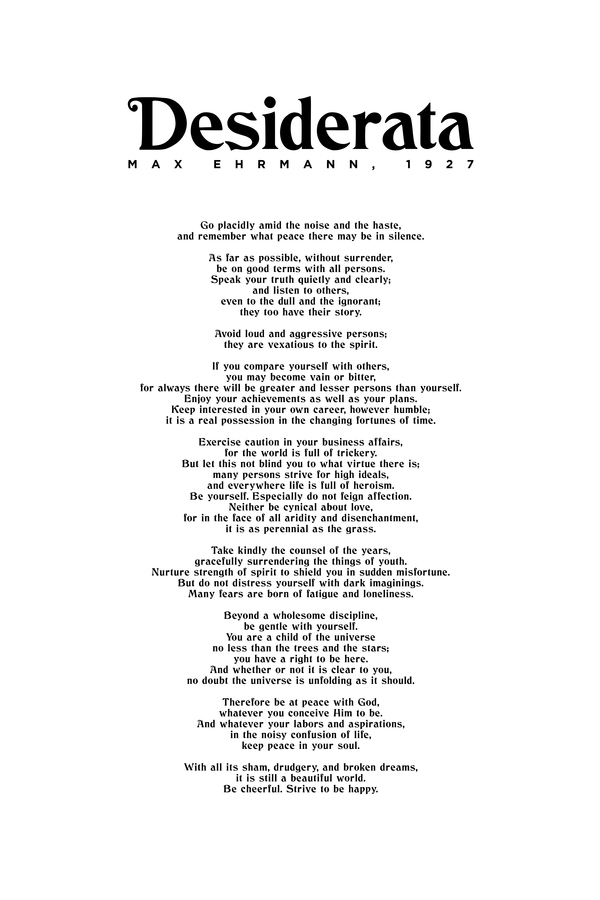Desiderata Explanation Every Stanza

Imagine a quiet afternoon, sunlight filtering through dusty library windows, illuminating aged pages filled with wisdom. A worn parchment, almost whispering with time, lies open. On it, the elegant script of a poem, a guide for living, a set of principles known as Desiderata.
This timeless piece, often found framed in homes or shared amongst friends, offers solace and guidance in navigating the complexities of life. But what does each stanza truly mean? This article delves into the profound message of Desiderata, exploring its individual lines and their enduring relevance in the modern world.
The Origins of Wisdom
Desiderata, meaning "things desired" in Latin, wasn't etched in stone by an ancient philosopher. Its author, Max Ehrmann, a lawyer and poet, penned it in 1927. Born in Terre Haute, Indiana, Ehrmann sought to articulate a personal philosophy, a set of principles for a fulfilling and meaningful existence.
Though often attributed to a much older source, perhaps even found in a church, the poem's true origin lies in Ehrmann's insightful mind. The misattribution only speaks to the poem's universality, its resonance across generations and cultures.
A Stanza-by-Stanza Journey
"Go placidly amid the noise and haste, and remember what peace there may be in silence." This opening stanza sets the tone, urging us to find tranquility amidst the chaos. It is a call for mindfulness, a reminder to seek inner peace even when surrounded by turmoil.
"As far as possible without surrender be on good terms with all persons." This speaks to the importance of relationships, advocating for harmony and understanding. Compromise and tolerance are key, without sacrificing one's own integrity.
"Speak your truth quietly and clearly; and listen to others, even the dull and the ignorant; they too have their story." Honesty and empathy are interwoven here. Everyone deserves to be heard, and wisdom can be found in unexpected places.
"Avoid loud and aggressive persons, they are vexations to the spirit." This suggests protecting one's mental well-being by limiting exposure to negativity. Surrounding oneself with positive influences can greatly impact one's overall happiness.
"If you compare yourself with others, you may become vain or bitter; for always there will be greater and lesser persons than yourself." The dangers of comparison are highlighted, reminding us to focus on our own journey. Self-acceptance and gratitude are essential for contentment.
"Enjoy your achievements as well as your plans." This encourages appreciation for both the process and the outcome. It's a reminder to savor the present moment and find joy in our accomplishments, both big and small.
"Keep interested in your own career, however humble; it is a real possession in the changing fortunes of time." Find pride in your work, regardless of its perceived status. Your efforts contribute to the world and provide a sense of purpose.
"Exercise caution in your business affairs; for the world is full of trickery." A practical reminder to be mindful of potential deceit and protect your interests. Due diligence and prudence are necessary in financial matters.
"But let this not blind you to what virtue there is; many strive for high ideals; and everywhere life is full of heroism." Despite the presence of negativity, recognize the good that exists. Acknowledge the kindness and courage of others.
"Be yourself. Especially, do not feign affection. Neither be cynical about love; for in the face of all aridity and disenchantment it is as perennial as the grass." Authenticity is paramount, and love should be embraced, even in difficult times. Love, in all its forms, is a constant source of hope.
"Take kindly the counsel of the years, gracefully surrendering the things of youth." Embrace the wisdom that comes with age, accepting the natural progression of life. Letting go of the past allows for growth and new experiences.
"Nurture strength of spirit to shield you in sudden misfortune. But do not distress yourself with dark imaginings. Many fears are born of fatigue and loneliness." Develop inner resilience to cope with challenges, avoiding unnecessary worry. Self-care and connection can alleviate anxiety.
"Beyond a wholesome discipline, be gentle with yourself." Practice self-compassion and kindness. We are all imperfect and deserve understanding, especially from ourselves.
"You are a child of the universe, no less than the trees and the stars; you have a right to be here." A powerful affirmation of belonging and self-worth. Reminding us of our interconnectedness and inherent value.
"And whether or not it is clear to you, no doubt the universe is unfolding as it should." A statement of faith and acceptance of the unknown. Trust in the natural order, even when things seem uncertain.
"Therefore be at peace with God, whatever you conceive Him to be, and whatever your labors and aspirations, in the noisy confusion of life keep peace with your soul." Find solace in your faith and maintain inner harmony. This final stanza emphasizes the importance of spirituality and self-awareness.
Enduring Relevance
The enduring popularity of Desiderata lies in its simple yet profound message. It offers guidance for navigating the complexities of life, reminding us to cultivate inner peace, practice compassion, and find meaning in our experiences. Its timeless wisdom continues to resonate, offering comfort and inspiration to those seeking a more fulfilling existence.
Desiderata serves as a gentle reminder to live intentionally, to appreciate the present moment, and to strive for a life of purpose and connection. It is a gift, a legacy of wisdom for all who seek it.

















